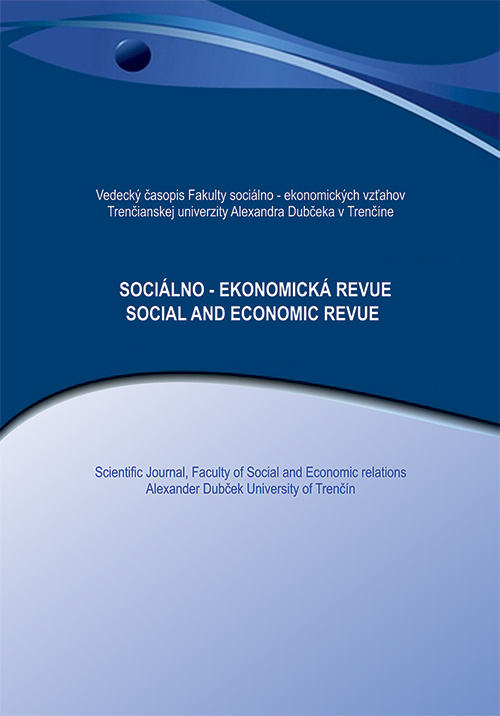BRAIN DRAIN IMPACT ON THE ECONOMY: BALTIC STATES CASE
Globalization processes in the world are increasingly facilitating for migration of people. Increasing openness of countries, improved transport systems, their convenience and accessibility make it easier, and easier for people to travel between countries. This encourages international migration. As most countries migrate most of their human resources, some countries face the problem of brain drain when leaving a country with highly skilled resources, transferring their competences to another country. Considering that people are one of the most important resources of the country, it is obvious that large emigration flows affect the social and economic situation of the country. The brain drain phenomenon is particularly painful for those countries that do not have significant economic advantages over other countries but have favourable conditions for people to leave - international agreements, visa-free regime, etc. In Europe, this is especially evident among former post-Soviet countries. Those who joined the European Union were faced with a massive flow of migration as they could not offer their citizens adequate financial wealth. This article aims to compare the Baltic States' situation with the brain drain. In this article, the authors seek to assess how brain drain affects the economies of countries and to make suggestions on how to deal with emerging problems.
Vydanie: 2019/1 Strany: 66-76 Klasifikácia JEL: J20, J61, O15
DOI:
Kľúčové slová: labour market, migration, brain drain, employment, Baltic States
Sekcia: SOCIAL CONTEXT OF THE ECONOMY, LABOR MARKET AND HUMAN RESOURCES DEVELOPMENT
Kontakty:
Mgr. Mantas Svazas,
PhD student,
Kaunas University of Technology (Lithuania),
School of Economics and Business
Gedimino st. 50-501, Kaunas, Lithuania.
E-mail: mantas.svazas@ktu.edu
Mgr. Manta Liberyte
University of Technology (Lithuania),
School of Economics and Business,
Gedimino st. 50-501, Kaunas, Lithuania.
E-mail: manta.liberyte@gmail.com
Literatúra:
Actina, G., Geipele, I., & Zeltins, N. (2015). Planning and managing problems of energy and energy efficiency at regional and district level in Latvia: Case study. In 2015 International Conference on Industrial Engineering and Operations Management (IEOM) (pp. 1-7). IEEE.
Central Statistical Bureau of Latvia (2019). Population. [online] [cit. 02-28.-2019]. Retrieved from: http://data.csb.gov.lv/pxweb/en/iedz/iedz
Didžgalvytė, M., Pukelienė, V. (2010). Protų nutekėjimas: užsienyje magistrantūros ir doktorantūros studijas baigusiųjų reemigracijos analizė ir vertinimas. Taikomoji ekonomika: sisteminiai tyrimai, 4 (1), pp. 123-138.
Edwards, C. (2016). Brain drain: More Italians than ever are moving abroad. [online] [cit. 02-28.-2019]. Retrieved from: https://www.thelocal.it/20161006/over-100000-italians-moved-abroad-in-2015
Estonia Statistics (2019). Statistical database. [online] [cit. 02-28.-2019]. Retrieved from: http://pub.stat.ee/px-web.2001/dialog/statfile1.asp
Eurostat (2019). Unemployment statistics [online] [cit. 02-28.-2019]. Retrieved from: https://ec.europa.eu/eurostat/statistics-explained/index.php/Unemployment_statistics#Recent_developments
Kramarz, F., Skans, O. N. (2014). When strong ties are strong: Networks and youth labour market entry. The Review of Economic Studies, 81(3), pp. 1164-1200.
Kripaitis, R., Romikaityté, B. (2005). Tarptautinė darbo jėgos migracija : jos esmė, formos ir ją sąlygojantys veiksniai. Ekonomika ir vadyba: aktualijos ir perspektyvos. No. 5, pp. 171-179.
Lemos, S., Portes, J. (2008). New labour? The impact of migration from central and eastern European countries on the UK labour market. IZA Discussion Paper No. 3756, Institute for the Study of Labor, Bonn.
Lietuvos statistikos departamentas (2019). Statistinių rodiklių analizė. [online] [cit. 02-28.-2019]. Retrieved from: https://osp.stat.gov.lt/statistiniu-rodikliu-analize#/
Maceika A. (1998). Globalizacijos, integracijos ir aljansų kūrimo strategijos. International conference “Ekonomikos reforma Rytų ir Vidurio Europoje”. Klaipėda, Lithuania. pp. 185–187
Martinkus, B., Stoskus, S., Berzinskiene, D. (2015). Changes of employment through the segmentation of labour market in the Baltic States. Engineering Economics, 63(4), pp. 41-48.
OECD (2019). Average wages [online] [cit. 02-28.-2019]. Retrieved from: https://data.oecd.org/earnwage/average-wages.htm
The World Bank (2019). GDP per capita (current US$) [online] [cit. 02-28.-2019]. Retrieved from:
https://data.worldbank.org/indicator/NY.GDP.PCAP.CD?end=2017&locations=LT-LV-EE&start=2008
United Nations Development Programme (2018). Human Development Reports. [online] [cit. 02-28.-2019]. Retrieved from: http://hdr.undp.org/en/2018-update
Vilpišauskas R. (2004). Globalizacija - griaunanti jėga ar naujos galimybės? [online] [cit. 02-28.-2019]. Retrieved from: https://www.llri.lt/Komentarai/Radijas16.phtml
Wells, J., Gruneberg, S., Dainty, A. (2005). CLR News. European minimum wage policy. No 3.


